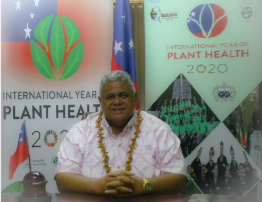Talofa and greetings to you all! This special message is being issued to commemorate
the International Day of Plant Health which is being observed on the 12 th of May
annually since it was launched by the Food and Agriculture Organisation (FAO) in 2020,
to remind ourselves of the importance of protecting the health of plants.
A resolution which was adopted by the UN General Assembly sets out that healthy
plants constitute the foundation of all life on Earth, as well as ecosystem functions, food
security and nutrition, adding that plant health is key to the sustainable development of
agriculture required to feed a growing global population by 2050. It will also be an
opportunity to highlight the significance of plant health as part of the FAO One Health
approach, involving how the health of people, animals, plants and the environment are
linked to one another. We must also not neglect the health of plants because keeping
them healthy will help us achieve the sustainable development goal (SDG) 2 on Zero
Hunger of the UN 2030 Agenda. These facts have been consolidated in the
observation often quoted, that human life and associated developments are solely
dependent on plants because they provide food, proper nutrition, economic
development and improved standards of living.
It is estimated that a total of 40% of crop plants grown for food worldwide is lost to pests
and diseases every year. The main means of entry and spread of pests and diseases
affecting agricultural crops and the environment are through the trading of goods,
visiting tourists and business visitors. An example of this that we still have not forgotten
was the destruction of our favourite Taro Niue and Taro Manu’a varieties by the Taro
Leaf Blight disease in 1994. This is why we need to be proactive now and protect our
plant resources. Another issue of contention we currently face is the continuing
damaging effects of Climate Change, especially to the environment and the crop plants
that we depend on.
There are many pests and diseases that have entered Samoa in the past due to our
carelessness and lack of interception and surveillance capabilities then. They include
the Coconut Rhinoceros Beetle, Banana diseases of Black Leaf Streak and Bunchy
Top, Giant African Snail, Taro Leaf Blight and many others that destroy and limit the
potential local production of our horticultural crops, mainly our vegetables and fruits.
These pests and diseases continue to be difficult to eradicate, and managing
(controlling) them is costly and time consuming.
Our Ministry of Agriculture and Fisheries has been working hard in the last several
years to protect Samoa from unwanted pests and diseases. A comprehensive process
of undertaking this work is by close adherence to the guidelines and regulations for the
movement of plant materials between countries as stipulated in the International Plant
Protection Convention or IPPC. It is important that we all work together to stop the
entry of unwanted pests and diseases into our country as well as their potential
establishment and spread. As part of our collective efforts, we also need to stop the
practice of bringing in plant materials or seeds when we return from a visit overseas, or
via mail or post, that we intend to grow, without the knowledge of our Ministry, or without
following the proper procedures as stipulated in our Quarantine (Biosecurity) Act 2005,
as they will expose Samoa to new pests and diseases which we may not be able to
eradicate or control. I therefore call on all our stakeholders in the agriculture space –
those involved in farming as producers and business operators, those handling and
processing plant products for the markets and retailers, to work with our Ministry to
safeguard our food supplies and prevent losses of income, from these unwanted pests
and diseases.
As part of the celebration of the International Day of Plant Health, public awareness
programmes and activities are being organized not only in Samoa but in other Pacific
island countries. In closing, I would like to take this opportunity to commend and
acknowledge FAO for the tireless efforts expended to protect our Pacific island
countries from unwanted pests and diseases, via financial and technical assistance and
advice. I now wish you all a blessed and successful commemoration of the
International Day of Plant Health. Soifua ma ia Manuia!

